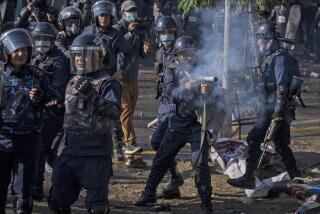300 Police Hurt in Tibet Clashes, China Reports
- Share via
HONG KONG — More than 300 police officers were injured in Saturday’s anti-Chinese rioting in the Tibetan capital of Lhasa, and officials exercising control over religious activities were poisoned, according to an official Chinese report published here Tuesday.
Of the injured officers, more than 30 were hurt severely enough to require hospitalization, according to the China News Service, a government-controlled news agency.
The report said that monks at the Jokhang Temple put poison in tea served to temple office staff--presumably employees and officials of the Tibetan branch of the state-approved Chinese Buddhist Assn. The association has an office at the Jokhang Temple and is viewed by many Tibetans as serving Beijing’s interests. Reporters representing state-run news organizations who were at the office were also poisoned, the report said.
The poison victims were hospitalized for treatment, the news service reported. It said nothing about their condition.
Monks Attack Office
The report said that angry monks attacked the temple office and that some government and Communist Party officials from Beijing and Lhasa escaped by sliding down ropes from a second-story window.
The China News Service reported one death--that of Yuan Shisheng, a policeman who was thrown from a building. Other sources have said that at least nine people died in the incident, including two police officers who were stoned and kicked to death, a monk who was shot by a police officer and others who were either shot or beaten to death by police.
The disorder began Saturday morning when about 300 young monks began calling out for Tibetan independence, according to Westerners who were in the area of the Jokhang Temple at the time.
Over the centuries, Tibet has sometimes been independent and sometimes a part of China. It has been firmly controlled by China since 1951, but many supporters of the Dalai Lama, Tibet’s exiled theocratic leader, dream of reasserting Tibetan independence.
The anti-Chinese disturbances continued Sunday as the rioters set up barricades in Barkhor, a street that goes around the Jokhang Temple, the news service reported. The protesters “indiscriminately threw stones, and numerous city residents were injured,” it said.
Lhasa was calm Monday and Tuesday, according to reports in China’s state-run media and to foreigners in Lhasa who talked with Western reporters by telephone. The Jokhang Temple remained closed Tuesday, but a police blockade barring access to the temple area had been lifted.
Although Westerners who were in Lhasa at the time of the rioting have told reporters that some Tibetans were killed by police gunfire, the official New China News Agency carried a report Tuesday quoting officials in Lhasa as saying that “no policemen carried arms while on duty that day.”
Chinese officials also denied accounts by Western witnesses that the police opened fire in similar rioting last Oct. 1, when as many as 14 people were killed. But in an extraordinary speech on Jan. 19 at a meeting of the regional People’s Congress of Tibet, the Panchen Lama, who is an official of China’s central government as well as the No. 2 religious leader of Tibetan Buddhism after the Dalai Lama, confirmed that police had, in fact, used firearms.
‘Fired Warning Shots’
“A number of policemen fired warning shots in the air or into the ground,” the Panchen Lama said in his speech, which was reported in the regional press in Tibet. “As a result, some ricochets injured or killed people. Only one person was killed directly by a bullet.”
The Panchen Lama added that “people have aired great complaints over the untruthful news reports about the riots.”
Chen Shiqiu, deputy head of China’s delegation to the U.N. Human Rights Commission, admitted to the commission in Geneva last Friday that police had opened fire on Oct. 1 and that two Tibetans and an ethnic Chinese were killed by gunfire. In that incident, two people were stoned to death and one died after falling from a roof, Chen said.
The Dalai Lama, who was accused by China of instigating the October rioting, issued a statement Monday from his office in New Delhi saying:
“The courage of the Tibetan people in expressing, once again, their dissatisfaction with Chinese rule despite the obvious risks involved clearly revealed their desperation.
“Even in the face of mounting Tibetan resentment, the Chinese leadership still fails to understand the true aspirations of the Tibetan people.”
He called on Tibetans to “restrain from violence despite any repressive measures the Chinese may take.”
More to Read
Sign up for Essential California
The most important California stories and recommendations in your inbox every morning.
You may occasionally receive promotional content from the Los Angeles Times.












